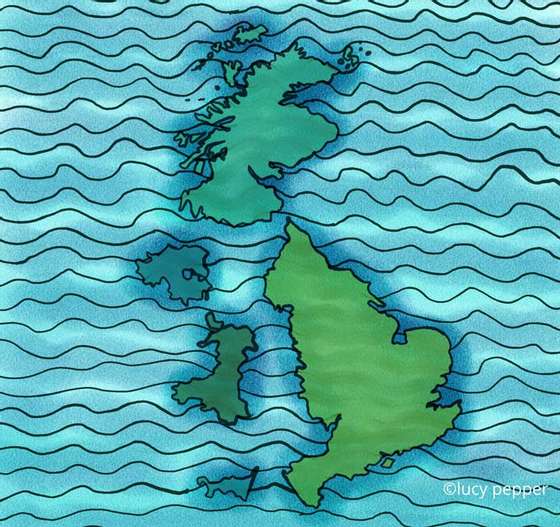Na semana passada, sugeri que, aos olhos do resto do mundo, Portugal não tem muito mais existência do que a de um destino de férias. Esta semana, acontece o referendo da independência da Escócia, e é possível que o Reino Unido deixe de existir — e não apenas metaforicamente.
No corrente Reino Unido, as relações entre os países individuais que o compõem são de facto complicadas… Os ingleses e os galeses odeiam-se uns aos outros. Os ingleses e os irlandeses do Norte suspeitam uns dos outros. Os galeses, os irlandeses do Norte e os escoceses (e por vezes, a gente da Cornualha, que também aspira à independência) sentem-se irmanados na luta contra o grande opressor inglês: os Celtas contra os “Normandos”… Esta semana, é a relação entre os escoceses e os ingleses que vai mesmo vai ser testada.
No corrente Reino Unido, a maior parte das pessoas que tem sangue escocês está sempre disposta a contar ao resto do mundo que tem sangue escocês. Ser escocês é fixe, é ter genes de guerreiro, pertencer às antigas tribos selvagens, forte e sem medo, o corajoso “underdog”. Coisas boas saíram da Escócia ao longo dos anos; o telefone, a televisão… o “teacake” de Tunnocks (é como uma bomboca, nojenta e doce — mas adoro-os). Nem preciso de mencionar Irn Bru (pode googlar) e whisky. A Escócia é atrevida, divertida e forte. É altamente refinada mas também rebarbativa. A Escócia é severa, cinzenta e escura, mas ao mesmo tempo consegue ver a piada das coisas.
Os ingleses gozam com os escoceses por serem preguiçosos, beberem e fumarem demasiado, só comerem fritos e morrerem de ataques cardíacos aos 27 anos, ou por serem presbiterianos velhos e rabugentos, contrários a tudo que é bom. No entanto, têm de admitir que adoram os escoceses, e desejariam ser tão resistentes e adorados como eles. Por isso, nas últimas semanas, os ingleses entraram em pânico, ao perceberem que podem mesmo perder a Escócia. Londres deixou tudo suspenso e correu a implorar aos escoceses que fiquem.
Do outro lado, os escoceses que têm sangue inglês nunca o declaram. Para eles, os ingleses são convencidos, arrogantes, fracos, pomposos — totós carecas que não sabem que o que têm é bom. Para os escoceses, os ingleses não são divertidos e queixam-se, em vez de fazer o que os escoceses fariam: continuarem a fazer o que tem de ser feito, mesmo à chuva e sem botas. Quanto mais do sul da Inglaterra é um inglês, pior é para os escoceses.
Os escoceses não confiam nada nos ingleses e, historicamente, têm razão. Nos últimos séculos, a Escócia foi muito mal tratada por Londres, embora eu não creia que Escócia tenha sido tratada de maneira pior do que o norte da Inglaterra ou outras regiões suficientemente remotas para Londres não lhes ligar nenhuma. Os londrinos, tal como os lisboetas, esquecem-se facilmente de que o país, e as vezes o mundo inteiro, não roda à volta deles.
O desprezo pelos ingleses na Escócia é forte, e é bem capaz de afectar o voto. Se o resultado for Sim, haverá pânico (nos dois lados), mas haverá optimismo (nos escoceses). Há tanta incógnitas por decifrar (a moeda e a filiação na UE; quanto petróleo ainda resta no Mar do Norte?; haverá passaportes novos e visas para os totós ingleses?), que será uma época difícil mas emocionante, essa de descobrir como vai ser um novo país.
Se o voto for Não, haverá amuos e discussões mas, acho eu, um grande sentido de alívio, especialmente no “País Ainda Chamado O Reino Unido da Grã-Bretanha e Irlanda do Norte, Graças a Deus”.
Ainda bem que não posso votar. Um lado, um grande lado, da minha família é escocesa, e faz-me impressão que de repente possa pertencer a um novo estado. A minha cabeça está interessada em ver como uma Escócia independente podia funcionar, embora me pareça arriscado, mas o meu coração não quer ver um Reino Desunido.
A Escócia é um dos bens maiores do Reino Unido, e não estou a falar do petróleo.
(traduzido do original inglês pela autora)
The Not-United Kingdom
Last week, I suggested that, in the eyes of much of the world, Portugal doesn’t really exist as anything other than a holiday destination. Well, this week, the Scotland Independence referendum will take place and it might very well mean that The United Kingdom will cease to exist, and not just metaphorically.
The relationships between the individual countries that make up The Current United Kingdom are, well, complicated. The English and the Welsh hate each other. The English and the Northern Irish are suspicious of each other. The Welsh, Northern Irish and Scottish (and, on some days, the Cornish, some of whom also want independence) feel a certain bond in the struggle against the English oppressor; Celts against Normans. Then there’s the Scottish and the English. Theirs is the relationship really being tested this week.
Many people who have Scottish blood are happy for anyone and everyone to know that they have Scottish blood. To be Scottish is cool, it is to have warrior genes, to be of the savage tribes of old, it is to be gritty and fearless and it is to be the brave underdog. Great things have come from Scotland over the years: the telephone, the television…. the Tunnock’s teacake (like a bomboca, disgusting and sweet, and I love them). I don’t even need to mention Irn Bru and whisky. Scotland is brash and funny and tough. It is highly refined and rough around the edges. Scotland is dour and driech and dark, but sees the funny side of things.
Although the English make fun of the Scots as being heavy-drinking, heavy-smoking couch potatoes who eat only deep fried food and die of heart attacks at 27 years old, or as grumpy, taciturn, old presbyterians sitting in their dank dark manse who are against everything, they have to admit that they just love the Scottish, and long to be as tough and beloved as their northern neighbours. Suddenly, when the Yes campaign started to gather momentum in the last few weeks, The English started to panic. They realised that it really could happen, they could lose Scotland. London dropped everything and went to plead with Scotland.
In the other direction, Scots who have English blood will never admit to it. For them, the English are stuck up, arrogant and weak. They are red-faced, bald nincompoops, silly people who don’t know when they’ve got it good. The English are not fun people, and they whine instead of doing what a Scot would do; just getting on and doing it, in the rain, with no boots. The further south an Englander comes from, the worse he is.
The Scottish do not trust The English and, historically, they have good reason. Over the centuries, Scotland was treated particularly badly by London, this is true. Over the last century, though, I don’t think Scotland has been treated much worse than the North of England or anywhere else remote enough for Londoners not to care about. Londoners, much like Lisboetas, forget that the country, if not the world, doesn’t revolve around them.
But the dislike is for the English is strong, and may well be colouring the vote. If the vote is Yes, there will be panic (on both sides) but optimism (on the Scottish side). There are so many unknowns to work out (such as currency, EU membership, how much oil is left, will there be border controls, new passports and visa requirements just for the English?) that it will be a difficult but exciting time, working out how the new country will work.
If the vote is No, there will be sulking and arguments but, I think, a sense of relief, especially in “The Country Still Known, Thank God, As The United Kingdom of Great Britain and Northern Ireland”.
I am glad I don’t have a vote. One side, one huge side, of my family is Scottish, and it feels very strange that, all of a sudden, they might belong to a different nation state. Although I think it’s a really risky move, my head would be interested to see how an independent Scotland might work, but my heart really doesn’t want to see Britain broken up.
Scotland is one of Britain’s greatest assets, and I’m not talking about the oil.










